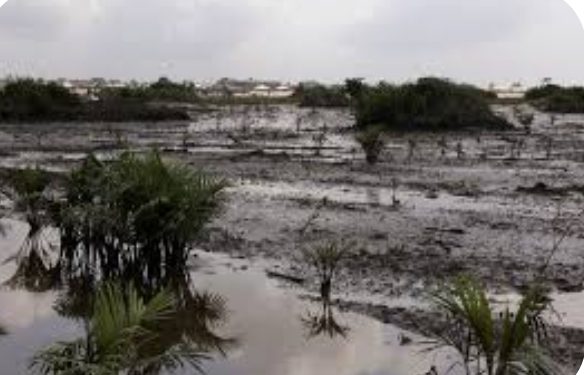*** Urge President Tinubu to Address Environmental and Health Crisis
By Comfort Olayinka
A coalition of Nigerian Civil Society Organizations (CSOs) has called for a halt to all divestments of oil assets by International Oil Companies (IOCs) in the Niger Delta, urging President Bola Tinubu and the National Assembly to step in.
The call comes amid concerns over the environmental damage, health crises, and economic instability caused by decades of oil exploration in the region.
The CSOs are particularly alarmed by Shell’s proposed sale of its remaining shares in Shell Petroleum Development Company (SPDC) to the Renaissance consortium, which they argue would leave the Nigerian state to bear the responsibility for extensive environmental and social liabilities.
The coalition is demanding a comprehensive review and a transparent process before any further divestments are approved.
“We are, again, compelled to raise our voices against the ongoing and potentially catastrophic divestment process by International Oil Companies (IOCs) operating in the Niger Delta, particularly Shell’s proposed sale of its remaining shares in Shell Petroleum Development Company (SPDC) to the Renaissance consortium. This proposed sale and similar divestment efforts by companies like TotalEnergies, would undermine national interests, as we have communicated in the past, and as the House of Representatives acknowledged.”
“A few days ago, we were alarmed to learn that President Bola Tinubu, under pressure from Shell and their home government, has ordered the Nigeria Upstream Petroleum Regulatory Commission (NUPRC) to approve Shell’s sale of its remaining shares in SPDC to the Renaissance consortium.”
” Despite the NUPRC’s initial rejection of this sale based on legitimate concerns, President Tinubu appears to be moving swiftly toward approving these divestments, bypassing the valid and urgent concerns raised by the National Assembly and the Nigerian people.”
“That is why we are calling on the National Aseembly to prevail on President Tinubu to respect the voice of the people and halt all further IOC divestment requests until significant matters of national concern are addressed.”
“The United Nations Environment Programme (UNEP) has provided alarming figures on the extent of the contamination in the Niger Delta. In Ogoniland, UNEP showed that benzene levels were found to be 900 times higher than the safe limits set by the World Health Organization (WHO).”
“This toxic substance is known to cause cancer and other serious health issues. Similarly, in Bayelsa, chromium levels in the environment are over 1,000 times the WHO limits, leading to severe pollution of water sources and a public health crisis.”
“These findings underscore the urgent need for a thorough cleanup and remediation before any further divestments are allowed.
Health Impacts on Local Communities: Local communities are enduring a health crisis as a direct result of oil pollution.”
” According to the Bayelsa State Oil and Environment Commission’s (BSOEC) report, toxic substances from oil pollution, such as total petroleum hydrocarbons (TPHs) and heavy metals (HMs), have infiltrated the air, water, and soil across the region. These pollutants have led to widespread respiratory issues, cancers, skin diseases, and other serious health conditions. “
“As a result many communities in the Niger Delta are suffering from illnesses that are directly tied to oil pollution, including respiratory diseases, skin conditions, and cancers.”
“The long-term health impacts of exposure to these toxins have worsened over the years, with limited medical resources available for affected communities.
The local population faces mounting economic costs as health issues continue to diminish their ability to work and sustain their families, further deepening poverty in an already impoverished region.”
“The United Nations Environment Programme (UNEP) report on Ogoniland estimated that it would take over $1 billion in remediation costs during an initial five years in Ogoniland alone, with the cleanup expected to take decades. The BSOEC estimates that it would cost a minimum of $12 billion in 12 years to address the cost of remediation in Bayelsa alone. We note that Following the Deepwater Horizon oil spill in the United States, BP, the company responsible, paid over $60 billion to address the impacts of one oil spill incident alone.”
“The environmental damage of the Niger Delta is much worse and has spanned decades. Based on the UNEP and BSOEC reports, it would take about $100 billion to address the environmental damage in the entire Niger Delta comprehensively.”
” Therefore, to allow Shell, TotalEnergies, or any other company to walk away from their responsibilities would mean transferring these liabilities to the Nigerian state, the Niger Delta states, and the Nigerian people. This is an unjust and unsustainable burden that would further exacerbate the challenges faced by communities already suffering from the effects of pollution and environmental neglect.”
“Failure of Past Asset Sales to Address Environmental Damage: The experiences from past asset sales by Shell, ENI/AGIP, ExxonMobil, and other IOCs have demonstrated a disturbing trend of companies walking away from their environmental responsibilities.”
” In particular Shell’s divestment to Aiteo in Nembe: This divestment has resulted in unresolved pollution, with no comprehensive plan for addressing the environmental damage caused by years of oil extraction. Instead of remediating the pollution, the new operator, Aiteo, has failed to act on the urgent need for cleanup, and the environmental situation has only worsened.”
“ExxonMobil’s divestment: In some instances, ExxonMobil’s sale of assets has led to an inadequate transfer of responsibility for remediation to new operators, who were not equipped to manage the contamination left behind. The result has been prolonged environmental degradation.”
“ENI/AGIP’s sale to Oando: This case has similarly failed to address the ongoing pollution and environmental destruction in the host communities.
These failed divestments have left behind unresolved liabilities and environmental devastation, further compounding the suffering of communities in the Niger Delta. The continued failure to address these issues when companies divest sets a dangerous precedent and leaves a legacy of environmental injustice.”
“The National Interest and the Urgency for Action We ask Mr. President to ensure that the immediate financial interests of a few multinational corporations and local profiteers do not outweigh the health, future, and survival of millions of Nigerians who have suffered for decades. President Tinubu must safeguard the future of Nigeria, ensuring that all its people, especially those in the Niger Delta, are not sacrificed for the benefit of global capital and a few local profiteers.”
“We want to make it absolutely clear: approving Shell’s or TotalEnergies’ divestment in its current form without addressing the profound environmental and social costs would be a grave injustice to the people of the Niger Delta and could lead to significant unrest in the region. It would be an affront to the generations of Niger Deltans who have fought and died for environmental justice, their homes, and their livelihoods.”
“Approving Shell’s SPDC share sale would send a dangerous message to all multinational corporations operating in Nigeria that they can extract our resources, leave devastation behind, and walk away without consequence. This is not just a question of corporate accountability; it is about Nigeria’s sovereignty, dignity, and the right of its people to live in a clean and safe environment.”
“We call upon President Tinubu to:
Immediately halt all divestment processes until a transparent, comprehensive, and inclusive review is undertaken that addresses Shell’s and TotalEnergies’ historical environmental and social liabilities.
Ensure inclusive and transparent consultation with state governments and the people of the sites of oil and gas extraction in the Niger Delta before any further divestment of IOC assets.”
“Hold Shell, TotalEnergies, and all other IOCs accountable for their past and ongoing environmental damage, and ensure they fund a full cleanup and remediation program across the Niger Delta.
Uphold the regulatory independence of NUPRC and allow it to fulfill its statutory duties without political interference.
Respect the resolution of the National Assembly, which has called for a halt to all divestments by international oil companies in Nigeria.
Ensure that new operators are properly vetted and committed to responsible environmental management and community welfare.”
“Create an Environmental Restoration Fund that is sufficiently funded to meet the full and complete costs of environmental cleanup and reparations based on credible estimates of independent international experts and contributed to by Shell, TotalEnergies, and other international oil companies and future operators to address the long-term damage caused by their operations.”
‘Provide community profit-sharing opportunities for host communities as part of any divestment agreement, ensuring that the local people benefit from the oil resources they have hosted for decades.
Mandate full disclosure of all environmental liabilities before divestment, requiring Shell, TotalEnergies, and any future operators to publicly declare and address all damages.
Include gas flaring cessation and decommissioning plans in any divestment agreement, with clear timelines for ending harmful practices.”











































